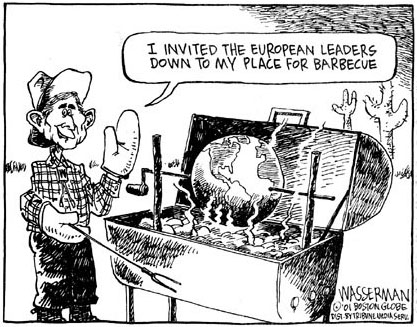|
by John Demos Although the Kyoto Climate Change Treaty came closer to a reality with an agreement at Bonn this past July, it was not officially "signed" and could still be derailed at the next meeting in Morocco later this fall.  The Bush Administration has been attempting to scuttle the historic accord by convincing the Japanese to join the United States and abandon the Treaty. Because the treaty needs a majority of the world's major polluters to sign on, Japan's bowing out would effectively spell doom for the agreement. The Japanese stood up to the United States at Bonn but the Treaty is being further weakened at every juncture. The document that survived Bonn contained no provisions to protect the world's forests. It is therefore necessary to focus attention on the US Congress and several pieces of legislation that could help deal with the crisis of global warming. It is up to Congress to take the lead on curbing climate change. Unfortunately they have already failed the first few tests. On August 1st the House of Representatives, with the backing of the White House, defeated an attempt to increase SUV mileage requirements. The measure called for a modest increase in mile-per-gallon efficiency, and its defeat once again highlights this Administrations unwillingness to support even the smallest reduction in our country's over consumption of energy. Later in the week the House passed a seriously flawed energy bill that included opening up the Arctic National Refuge to oil and gas exploration. The increase in SUV mileage, voted down by many of the same Representatives who supported drilling, would have offset the need for the Arctic oil. Another bill in the House and Senate, the so-called Four Pollutant Bill, has bipartisan support, but faces stiff opposition from the president. This bill would treat carbon dioxide emissions from power plants in the same way as other pollutants. Although Bush pledged to support such a measure during last year's campaign, he reversed his position shortly after being elected. Led by Senator Jeffords of Vermont, the bill has the backing of Maine's two Senators, but efforts by others to substitute a voluntary plan could effectively render the legislation largely meaningless. Another piece of legislation is being hammered together in the Senate Committee on Energy and Natural Resources. Co-sponsored by Senators Wyden (D-OR) and Brownback (R-KS), the measure would provide monetary support to forest and agricultural activities that improve carbon sequestration. This would be paid for through a carbon trading system in which over-emitters of carbon dioxide (i.e. power plants and factories) would pay landowners and farmers who were practicing low emission, or zero emission farming and forestry. Unfortunately, the forest sections of the Wyden-Brownback
bill do not focus on the urgent need to protect natural forests
and provide habitat for listed species. These even go so far
as to exclude forest protection from eligibility for the bill's
revolving loan assistance program. Even if forest protection
were to be made eligible, the emphasis would still be strongly
in favor of the considerably less ecologically beneficial activity
of tree planting. The Bush Administration has failed to take a leadership role in fighting the threat of climate change and is unlikely to change its stance in the foreseeable future. The Kyoto Agreement continues to be eroded and may still fall by the wayside. That is why the task now falls to our elected officials in the U.S. Congress. The tragic terrorist attack that we have just suffered may further erode efforts to get our energy usage under control. We must remind our leaders that real energy independence cannot be achieved until we reform our wasteful ways. Please call Maine's Congressional delegation and demand that they support changes in our national energy policy that would tighten SUV and light truck mile-per-gallon standards, oppose any oil or gas exploration in the Arctic National Wildlife Refuge, and shift funding from energy extractive practices to conservation, energy efficiency and green energy. Ask them to support the so-called Four Pollutant Bill that will tighten caps on sulfur and nitrogen emissions and regulate mercury and carbon dioxide emissions for the first time. Also ask them to oppose the Wyden-Brownback Bill S.1255 in its present form and seek changes that will: 1)Ensure the protection of old growth and native forest systems while discouraging clearcutting, tree plantation and other harmful practices. 2) Create an Advisory Committee that includes environmental, recreational, clean water, and other vested interests. 3) Protect habitat for listed species. For more information: contact Dr. Aaron Rappaport at 202-547-9098 or arappaport@mindspring.com HotEarth.net - http://environet.policy.net/warming/ - A source for information on global warming and how you can help prevent it. Greenpeace USA - http://www.greenpeaceusa.org/climate/ Climate Ark - Climate Change Portal - http://www.climateark.org/ - The Climate Ark is a Climate Change Portal and Internet Search Tool that provides access to reviewed climate change and alternative energy news and information. Climate Solutions (formerly Atmosphere Alliance) - http://www.climatesolutions.org/ - Climate Solutions works to effectively communicate the urgent need for action on global warming and promotes the rapid acceleration of clean energy technologies and more livable development of our communities. John Demos is Northeast Representative of American Lands Alliance. For more information go to: www.americanlands.org |